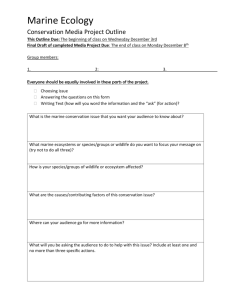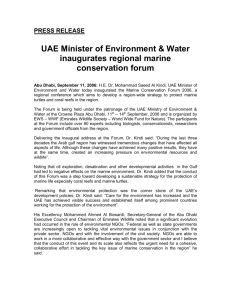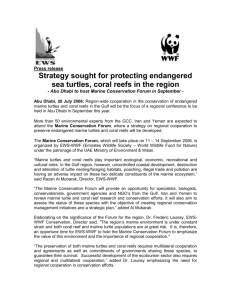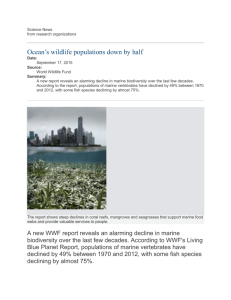Regional marine conservation conference ends on a
advertisement
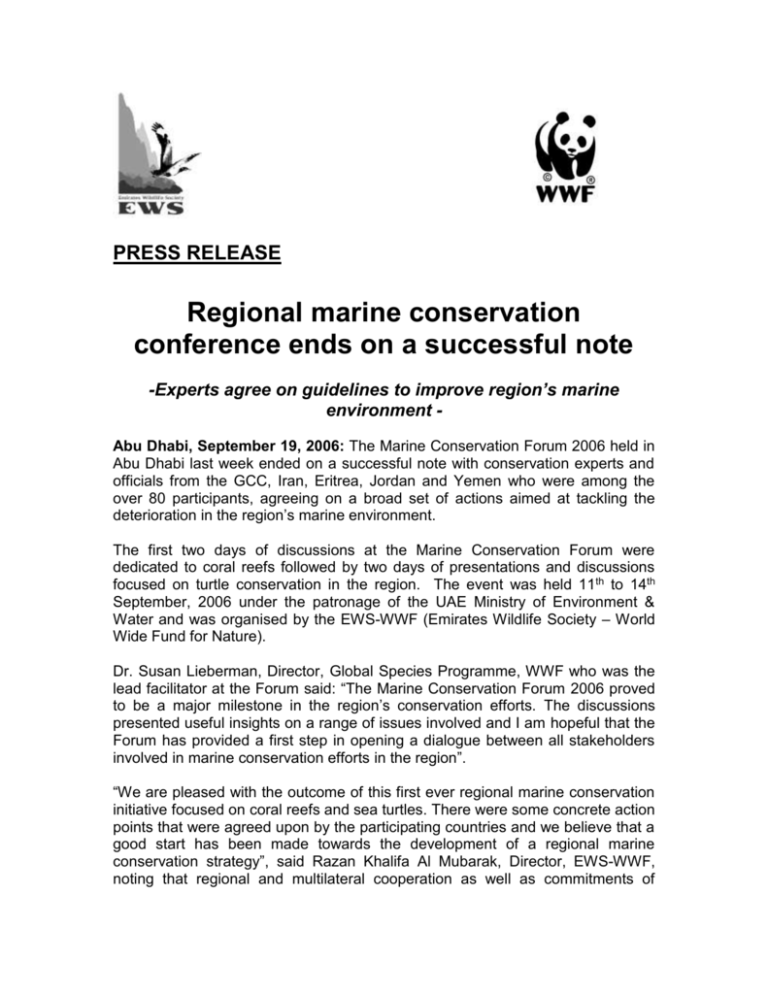
PRESS RELEASE Regional marine conservation conference ends on a successful note -Experts agree on guidelines to improve region’s marine environment Abu Dhabi, September 19, 2006: The Marine Conservation Forum 2006 held in Abu Dhabi last week ended on a successful note with conservation experts and officials from the GCC, Iran, Eritrea, Jordan and Yemen who were among the over 80 participants, agreeing on a broad set of actions aimed at tackling the deterioration in the region’s marine environment. The first two days of discussions at the Marine Conservation Forum were dedicated to coral reefs followed by two days of presentations and discussions focused on turtle conservation in the region. The event was held 11th to 14th September, 2006 under the patronage of the UAE Ministry of Environment & Water and was organised by the EWS-WWF (Emirates Wildlife Society – World Wide Fund for Nature). Dr. Susan Lieberman, Director, Global Species Programme, WWF who was the lead facilitator at the Forum said: “The Marine Conservation Forum 2006 proved to be a major milestone in the region’s conservation efforts. The discussions presented useful insights on a range of issues involved and I am hopeful that the Forum has provided a first step in opening a dialogue between all stakeholders involved in marine conservation efforts in the region”. “We are pleased with the outcome of this first ever regional marine conservation initiative focused on coral reefs and sea turtles. There were some concrete action points that were agreed upon by the participating countries and we believe that a good start has been made towards the development of a regional marine conservation strategy”, said Razan Khalifa Al Mubarak, Director, EWS-WWF, noting that regional and multilateral cooperation as well as commitments of governments that share species was crucial to the preservation of both marine turtles and coral reefs. Outlining some of the key areas that were agreed upon at the Forum, Al Mubarak said: “The standardization and coordinated analysis of coral reef and marine turtle populations across the region were identified as key starting points in the joint conservation effort”. “The migratory nature of turtles who may feed in one area and nest in another, as well as the commonality in natural and man-made threats to coral reef and turtle populations in the region make it imperative that regional information exchange and monitoring of conservation programmes is undertaken to obtain a macro perspective” she said. Al Mubarak also noted that other conservation priorities that were identified by participants were the establishment of more MPAs (Marine Protected Areas), guidelines for reclamation and dredging in sensitive zones, as well as strengthening enforcement of laws and regulations related to natural resources. “With specific reference to the massive coastal developments that were being undertaken in the region, there was agreement that a significant reform of the EIA (Environmental Impact Assessment) process was needed. Transparency in the process, a strengthened role for environment protection agencies, and stakeholder input into decision-making were identified as key elements in this reform process” she remarked. Participants at the Forum also proposed the establishment of a participatory environmental council at provincial and national levels to tackle marine environmental issues which would involve fishermen, environmental NGOs and other local stakeholders in committees formed at regional and national levels. Among the other recommendations made at the Forum were the improvement of collaboration and communication between national and regional conservation organisations, public outreach, media education, building awareness among the public and business sectors and the creation of teams to revise existing environmental laws to make them more effective and participatory. The Forum also drew appreciative comments from the participants. Gamal Al Harrani, Marine Environment Specialist at the Environment Protection Agency in Yemen said: “The format of the Forum which started off with experts sharing an international perspective to conservation efforts, followed by country presentations and break-out sessions for smaller focus-groups was very conducive to learning and interaction”. Commending the organisers, Khawla Al Muhannadi, President of the Environment Friends Society in Bahrain said: “The Forum was well-planned and organized in every respect. It had participants from NGOs, government officials as well as international facilitators to provide a holistic view of the issues involved”. First Gulf Bank was the main sponsor of the Forum. Tourism Development & Investment Company (TDIC) and TOTAL were the co-sponsors with Dolphin Energy as a support sponsor of the event. - ends – Background note: Of the seven known species of marine turtle, five are found in the Gulf waters – Green, Hawksbill, Loggerhead, Olive Ridley and Leatherback - all of which are listed as Endangered, with the Hawksbill and Leatherback being Critically Endangered (IUCN Red List). About 8% of the earth’s mapped reefs occur in the Middle East, where the shallow waters of the Gulf harbour extensive reefs, particularly along offshore islands. The reefs are of scientific interest because of their ability to survive in the highly stressful environment with extremes in water temperature and salinity. EWS-WWF is working on a bi-national (UAE and Qatar) project on investigating coral reefs in the territorial waters of the two countries. The project is sponsored by Dolphin Energy. For further information: Rashmi De Roy Communications Officer EWS – WWF Tel: 009714 353 7761 Fax: 009714 353 7752 Email: rderoy@wwfuae.ae http://www.panda.org/ OR Brian Carvalho ASDA'A Public Relations Ph: 009712 6334133 Fax: 009712 6334233 Mob: 00971 50 3117167 Email: b.carvalho@asdaa.com
